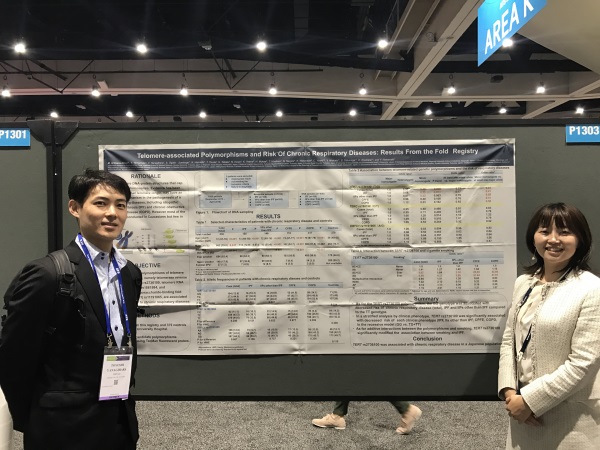Masako Arimura
Research Institute for Diseases of the Chest, Graduate School of Medical Sciences, Kyushu University
APSR/ISRD Session at the ATS International Conference 2018 - post-session report

I would like to thank the APSR for supporting my attendance at the 2018 ATS International Conference in San Diego, California.
The ATS is one of the most important meetings of the year in respiratory science and covers a wide range of topics in clinical and basic science. There were approximately 6,700 abstracts and case reports, and 500 sessions on basic and clinical research in the fields of pulmonology, critical care and many other subjects. I was surprised at this large-scale international conference because I participated in ATS for the first time.
It was an honour to have the opportunity to present "Telomere-associated Polymorphisms and risk of Chronic Respiratory Diseases, Results from Fold Registry" in an oral and a thematic poster session at the conference.
Telomeres are DNA-protein structures that cap the ends of chromosomes. Evidence has been accumulating that telomere length may have an important mechanism in the pathogenesis of a variety of lung diseases, including idiopathic pulmonary fibrosis (IPF) and chronic obstructive pulmonary disease (COPD). However, most of the studies are conducted in Caucasians but few in Asians. Our study aimed to investigate whether polymorphisms of telomere length related genes are associated with susceptibility to chronic respiratory diseases in a Japanese population.
In this presentation, I was lucky enough to meet with many key scientists in my field from across the world and gain some knowledge and career advice from them. It was very helpful to gain feedback from this study and to discuss future plans for this work. Aside from my presentation, I heard about the latest respiratory research presentation by young investigators in Asia-Pacific countries, for which I am very grateful for. In addition, Dr Ortega's symposium and several posters showed racial differences in the genetic background, and the difference was important for precision medicine. The guidance shows the direction of our research. Overall, it was a wonderful and valuable experience to attend this conference. I would again like to thank APSR that allowed young investigators like me to attend ATS International Conference.
